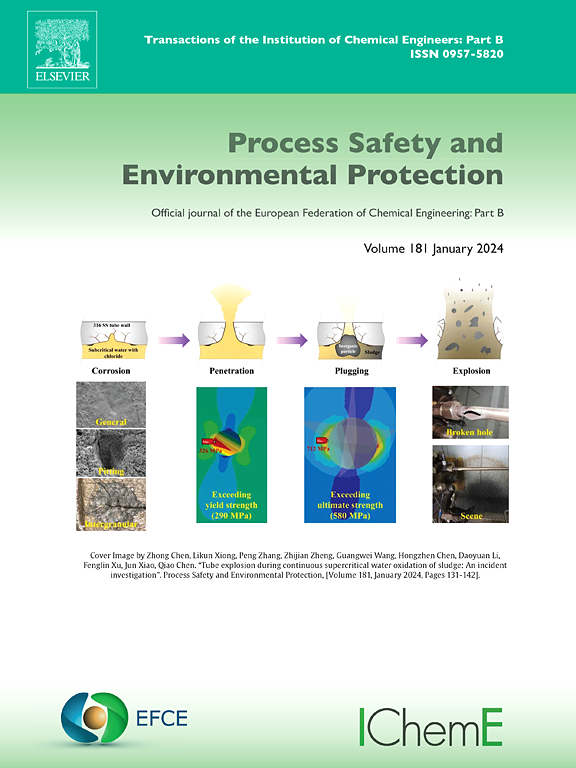通过甲基杆菌和水杨酸(SA)诱导缓解铅(Pb2+)对甜瓜(cucummelo L.)的毒性:生理-生物分子反应调节、氧化应激和铅吸收减少
IF 7.8
2区 环境科学与生态学
Q1 ENGINEERING, CHEMICAL
引用次数: 0
摘要
铅(Pb)是一种有毒金属,会破坏植物生长并污染生态系统,对环境构成重大威胁。本研究评估了耐铅甲基杆菌和水杨酸(SA)对污染甜瓜生长、生理-生物分子反应和铅吸收的影响。两种根菌均能耐受铅,在金属胁迫下产生显著的生长调节物质,并表现出显著的铅生物吸附潜力。1.0 mgPbkg−1的Pb严重阻碍了植物的生长和生理,同时增加了植物的氧化胁迫和金属含量。耐铅菌株和SA减轻了金属毒性,促进了甜瓜生长。在0.1 mgPbkg−1土壤条件下,24A、24B、24A+24B、SA和24A+24B+SA与未接种对照相比,根系生物量(24%、29%、47%、12%和88.2%)、总叶绿素(44.6%、39.5%、43%、31.6%和41.5%)和类胡萝卜素(14.3%、20%、42.8%、14.3%和50%)均显著增加。SA与菌株(24A+24B)联合处理降低了氧化应激;在0.1 mgPbkg−1应激下,MDA(46.9%)、H₂O₂(65.1%)和电解质漏出(54.4%)。此外,抗氧化酶防御和ROS解毒相关基因的表达在pb处理的植物中得到增强。在0.1 mgPbkg−1胁迫下,甲基杆菌联合体和SA降低了根(65.45%,89%)、茎(64.8%,100%)和茎(69.7%,100%)对Pb的吸收,增强了对Pb的耐受性。甲基菌联合体的缓解作用强于单个菌株或SA。目前的研究结果表明,将耐金属PGPR接种与外源SA施用相结合可以提高铅污染土壤中的植物产量,为提高污染农业系统中作物的抗逆性和生产力提供了一种有前景的可持续策略。本文章由计算机程序翻译,如有差异,请以英文原文为准。
Alleviating lead (Pb2+)-induced toxicity in muskmelon (Cucumis melo L.) through Methylobacterium sp. consortium and salicylic acid (SA)-priming: Physio-bio-molecular response modulation, oxidative stress, and Pb uptake reduction
Lead (Pb) is a highly toxic heavy metal that disrupts plant growth and contaminates ecosystems, posing a significant threat to human health. This study assessed the impact of Pb-tolerant Methylobacterium sp. and salicylic acid (SA) on the growth, physio-bio-molecular responses, and Pb uptake in muskmelon plants grown under Pb-contaminated soil. Both rhizobacterial strains showed resistance to Pb, produced significant amounts of growth-regulating substances under metal stress, as well as displays notable Pb biosorption potential. Muskmelon plants grown with at 1.0 mgPbkg−1 soil showed reduced plant growth and altered physiological characteristics, primarily as a result of increased oxidative stress and elevated metal content within the plants. Pb-tolerant bacterial strains and SA mitigated Pb metal toxicity and boosted muskmelon growth traits. Under 0.1 mgPbkg−1 soil, 24 A, 24B, 24 A+ 24 B, SA, and 24 A+ 24 B+SA increased root biomass (24 %, 29 %, 47 %, 12 % and 88.2 %), total chlorophyll (44.6 %, 39.5 %, 43 %, 31.6 % and 41.5 %) and carotenoids (14.3 %, 20 %, 42.8 %, 14.3 % and 50 %), over non-inoculated control. Combined SA and bacterial strains (24 A+24B) treatment lowered oxidative stress; MDA (46.9 %), H₂O₂ (65.1 %), and electrolyte leakage (54.4 %) under 0.1 mgPbkg−1 stress. Additionally, antioxidant enzyme defense and ROS detoxification-related gene expression in Pb-treated plants were enhanced. The Methylobacterium consortium and SA reduced Pb uptake in roots (65.45 %, 89 %), stems (64.8 %, 100 %), and shoots (69.7 %, 100 %) under 0.1 mgPbkg−1 stress, thereby enhancing Pb tolerance. The mitigating effects were more pronounced with the Methylobacterium consortium compared to individual strains or SA. The current finding suggests that combining metal-tolerant PGPR inoculation with exogenous SA application could enhance plant production in Pb-polluted soil, offering a promising, sustainable strategy for improving crop resilience and productivity in contaminated agricultural systems.
求助全文
通过发布文献求助,成功后即可免费获取论文全文。
去求助
来源期刊

Process Safety and Environmental Protection
环境科学-工程:化工
CiteScore
11.40
自引率
15.40%
发文量
929
审稿时长
8.0 months
期刊介绍:
The Process Safety and Environmental Protection (PSEP) journal is a leading international publication that focuses on the publication of high-quality, original research papers in the field of engineering, specifically those related to the safety of industrial processes and environmental protection. The journal encourages submissions that present new developments in safety and environmental aspects, particularly those that show how research findings can be applied in process engineering design and practice.
PSEP is particularly interested in research that brings fresh perspectives to established engineering principles, identifies unsolved problems, or suggests directions for future research. The journal also values contributions that push the boundaries of traditional engineering and welcomes multidisciplinary papers.
PSEP's articles are abstracted and indexed by a range of databases and services, which helps to ensure that the journal's research is accessible and recognized in the academic and professional communities. These databases include ANTE, Chemical Abstracts, Chemical Hazards in Industry, Current Contents, Elsevier Engineering Information database, Pascal Francis, Web of Science, Scopus, Engineering Information Database EnCompass LIT (Elsevier), and INSPEC. This wide coverage facilitates the dissemination of the journal's content to a global audience interested in process safety and environmental engineering.
 求助内容:
求助内容: 应助结果提醒方式:
应助结果提醒方式:


